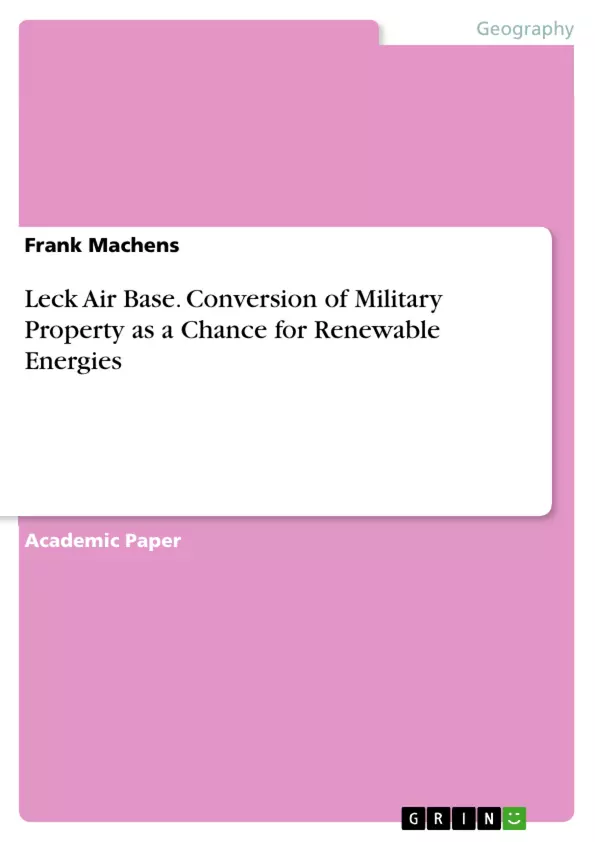This paper copes with the topic of military conversion at hand of the lead example Leck Air Base. This former military airport of the German Forces is located in Schleswig-Holstein, Germany. The
aim of this paper is to outline the chances for the integration of renewable energy based concepts. Hereby, the special, manifolded problematic of conversion processes but also
solutions are discussed.
The first introductory chapter illustrates the basic idea of this paper together with an outline of the Leck Air Base conversion project and a definition of relevant terms. The second chapter
gives explanations about the region, involved municipalities and the special linkage to the Southern Denmark Region. This is containing information about geographic and socio-economic
relations. A deeper economic analysis and an analysis of the overall energy potential is following in the third chapter. Furthermore, case studies of similar projects in Germany are analyzed in the subsequent fourth chapter. Both, the third and the fourth chapter, built up relevant information for the fifth chapter. Here, the results of both chapters are combined, problems are discussed and possible solutions introduced. The final sixth chapter summarizes the results of this paper.
The results leads to specific suggestions for the conversion of Leck Air Base and to more general suggestions for the overall conversion process. This paper shows that the usage of mixed
concept out of renewable energy park, industrial park, tourism and natural reserve is indicated for the example of Leck Air Base, but also explains that due to structural, economic characteristics a focus on renewable energy concepts alone is not of advantage. General problems as the resistance of affected residents, especially through the suggested lead technology of wind energy, can partly be avoided by alternative financial concepts as the
Bürgerpark. Still, it is shown that conversion projects are facing highly individual problems and an assessment on a general basis is not sufficient.
Inhaltsverzeichnis (Table of Contents)
- Introduction
- The Project
- Definition of Conversion
- Region and Object
- The Object: Leck Air Base
- The Region and City of Leck
- Analysis
- Economical Aspects
- Energy Aspects
- Energy Potential
- Current Status
- Summarized Results
- Case Studies
- Case: Eggebek
- Case: Saerbeck
- Case: Morbach
- Comparison
- Conclusion
Zielsetzung und Themenschwerpunkte (Objectives and Key Themes)
This paper aims to examine the potential for integrating renewable energy concepts into the conversion of the former Leck Air Base in Schleswig-Holstein, Germany. The paper investigates the challenges and opportunities associated with conversion processes, particularly in the context of renewable energy development. * **Military Conversion:** The paper focuses on the conversion of a former military facility into a civilian use, specifically exploring the opportunities for renewable energy integration. * **Renewable Energy Potential:** The paper analyzes the potential of renewable energy sources, such as wind and solar, in the region surrounding Leck Air Base. * **Economic and Social Impact:** The paper assesses the economic and social implications of conversion and renewable energy development on the region and its inhabitants. * **Case Studies:** The paper examines several case studies of similar conversion projects in Germany, highlighting successful and challenging aspects of renewable energy integration. * **Comparison and Conclusion:** The paper compares the findings of the case studies with the Leck Air Base situation and draws conclusions about the feasibility and challenges of implementing renewable energy concepts in military conversion projects.Zusammenfassung der Kapitel (Chapter Summaries)
- **Introduction:** This chapter introduces the project focusing on the conversion of Leck Air Base and defines key terms related to the concept of conversion.
- **Region and Object:** This chapter provides a detailed description of the Leck Air Base and its surrounding region, including the geographical and socio-economic characteristics.
- **Analysis:** This chapter delves into the economic and energy aspects of the project, analyzing the potential of renewable energy sources in the region and the current status of energy production.
- **Case Studies:** This chapter explores several successful and challenging case studies of similar conversion projects in Germany, focusing on the integration of renewable energy concepts.
- **Comparison:** This chapter compares the findings of the case studies with the specific context of Leck Air Base, identifying potential problems and opportunities related to renewable energy implementation.
Schlüsselwörter (Keywords)
The central keywords and focus topics of this paper include military conversion, renewable energy integration, economic analysis, energy potential, case studies, regional development, and socio-economic impact. The paper specifically explores the integration of renewable energy concepts, such as wind and solar power, into the conversion of a former military facility. It investigates the economic and social aspects of conversion and renewable energy development, analyzing case studies of similar projects in Germany.Frequently Asked Questions
What is the main topic of the paper on Leck Air Base?
The paper focuses on the military conversion of the former Leck Air Base and its potential for renewable energy integration.
Where is Leck Air Base located?
It is located in Schleswig-Holstein, Germany, with close ties to the Southern Denmark Region.
Why is a focus on renewable energy alone not always ideal?
The study suggests that a mixed concept including industrial parks, tourism, and nature reserves is more effective than focusing solely on energy.
What are common problems in military conversion projects?
Common issues include economic structural challenges and local resistance, particularly regarding wind energy technology.
What is the "Bürgerpark" concept?
It is an alternative financial concept designed to reduce resident resistance by involving them in the project's success.
- Citation du texte
- Frank Machens (Auteur), 2014, Leck Air Base. Conversion of Military Property as a Chance for Renewable Energies, Munich, GRIN Verlag, https://www.grin.com/document/275174



